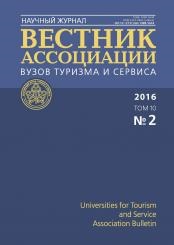The economy of the tourist market is formed and functions on the basis of integrate d-interdependence of enterprises in the region, the activities of which are directly or indirectly linked with the economy of tourism; the preservation of the ecological balance of natural resources and historical and religious sites to recreational areas. The objective and desired result of regional economic development is to create, maintain competitive advantage and achieve a higher level of competitiveness as a whole sphere of tourism. Profiling of the region should be aimed at creating a highly tourist center of international level that will enable the long-term economic development. The actual content of the concept of tourism identified in the course of the collision of these positive trends and negative results, and will largely depend on the overall situation in the country, but on the other hand, will largely determine the economic situation in Russia. Different types of tourism activities correspond to proportionate travel areasl, which are part of the social space combining a set of interconnected natural and socio-economic conditions that are used for the tourism industry. The size and composition of the internal organization of the tourist area has a hierarchical structure. The author analyses the structure of the regional tourism market and its actors as well as main approaches to the formation of the concept of governance tourist complex in the tourist region. The article is aimed at discussion on approaches to spatial and regional clustering of tourist areas, the basic conditions for the creation of tourist clusters, for the establishment and management of the tourism cluster.
cluster, land, tourism, management
Каждая страна и даже регион формируют для себя собственную концепцию развития туризма. Это связано с отличиями регионов мира по составу туристско-рекреацион-ных ресурсов, уровню их привлекательности для жителей других стран и районов, качеству жизни местного населения, характеру экономических задач, решаемых в настоящее время обществом. Большую роль играет аспект экономической эффективности и целесообразности развития туризма, который в рыночной экономике определяется зачастую не прямой отдачей вложенных средств, а тем, чего мы лишаемся, не вкладывая эти средства в другую сферу. Но значение туризма в социально-экономическом развитии страны трудно переоценить. Ускорение темпа жизни, ухудшение экологической ситуации как природной, так и социальной среды приводят к синдрому «накопленной усталости», снижению иммунитета, повышению заболеваемости и смертности населения. И именно перед туристским бизнесом стоит не только создание экономически эффективной деятельности, но и решение социальной задачи ликвидации последствий этих негативных влияний, посредством организации условий для восстановления сил, здоровья, получения новых знаний, впечатлений. На сегодняшний день отсутствуют единые,
1. Vasilenko V.N. Arkhitektura regional´nogo ekonomicheskogo prostranstva: Monografiya / NAN Ukrainy. In-t ekonomiko-pravovykh issledovaniy. Donetsk: OOO «Yugo-Vostok, Ltd», 2006. 311s.
2. Ґudz´ P.V. Ekonomіchnі problemi rozvitku kurortno-rekreatsіynikh. Donets´k: ІEPD NAN Ukraїni, TOV «Yugo-Vostok, Ltd», 2001. 270 s.
3. Dashkova A.P. Predprinimatel´stvo i biznes. M.: Filin, 1996. 341 s.
4. Lyubimtseva O.O. Rinokturistichnikhposlug(geoprostorovі aspekta). 3-e vid., pererob. ta dop. K.: «Al´-terpres», 2005. 436 s.
5. Mamutov V.K., Akmola A.I., Dement´eva T.N. i dr. Rekreatsiya: sotsial´no-ekonomicheskie i pravovye aspekty/Akademiya nauk Ukrainy. Institut ekonomiki promyshlennosti. K.: Naukova dumka, 1992.141 s.
6. Nesterenko A.V. Vliyanie klastera na povyshenie proizvoditel´nosti predpriyatiy g. Berdyanska. Khar´kov: TOV «Znaniya LTD» 2001. 48 s.
7. Porter M. Mezhdunarodnaya konkurentsiya. M.: Mezhdunarodnye otnosheniya, 1993. 495 s.
8. Ustoychivoe razvitie turizma. Posobie dlya spetsialistov po mestnomu planirovaniyu. Madrid: Vsemirnaya turistskaya organizatsiya, 2003. Elektronnyy resurs: tochka dostupa www.world-tourizm.org/raso (data obrashcheniya: 09.09.2014).
9. Shvets I.Yu. Regional´noe upravlenie konkurentosposobnost´yu turisticheskikh uslug: metodologiya i praktika. Simferopol´: ChP Predpriyatie Feniks, 2011. 364 s.
10. Shvets Yu.Yu. Formirovanie regional´noy sistemy upravleniya innovatsionnym razvitiem sfery turizma. Simferopol´: DAYPI, 2012. 339 s.
11. Shvets Yu.Yu. Kontseptual´nye podkhody k upravleniyu innovatsionnoy deyatel´nost´ turisticheskogo regiona. Vіsnik Natsional´nogo tekhnіchnogo unіversitetu «Kharkіvs´kiy polіtєkhnіchniy іnstitut». Zbіrnik naukovikh prats´. Tematichniy vipusk: Tєkhnіchniy progres і efektivnіst´ virobnitstva. Kharkіv: NTU «KhPІ». 2011. № 7-1. S 175-179.
12. HobibyA. Motives and Markets. Lexington, MA: Lexington Books, 1998. 261 s
13. Piercy N. Market strategic Change. London: Harper Collins, 1991. 419 s





